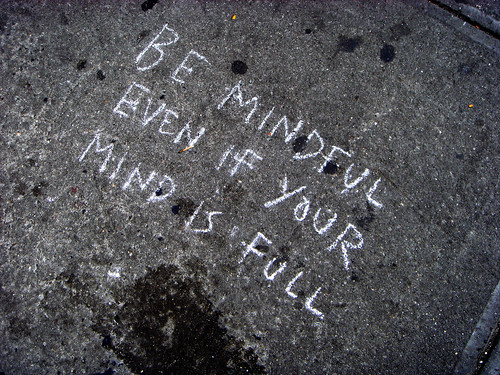 Mind your own business
Mind your own business
(Article source: www.theage.com.au)
Megan Gressor
November 24, 2006
Concentrate on every little action to reduce racing thoughts and stress.
It is said to boost performance and wellbeing, decrease anxiety, depression and chronic fatigue, and have beneficial effects on conditions ranging from chronic pain and fibromyalgia to psoriasis, multiple sclerosis and even cancer. But it's not a futuristic wonder drug - it's an ancient Buddhist discipline gaining increased acceptance in mainstream medicine.
It is mindfulness meditation, also known as "insight meditation". Its foremost proponent is Jon Kabat-Zinn, who is visiting Australia this month. Professor Emeritus at the University of Massachusetts Medical School, where he founded the Centre for Mindfulness in Medicine, Health Care and Society, Kabat-Zinn has researched mind-body interactions for more than 25 years, focusing on the applications of meditation in the treatment of stress-related disorders.
He developed the Mindfulness-Based Stress Reduction program now used in settings as varied as schools, corporations and prisons in the US and hospitals worldwide.
Meditation may sound like an alternative practice to some, but there is hard science to back up its effects. It is the subject of increasing studies by other researchers, including Dr Belinda Khong, a practising psychologist with a special interest in the integration of Buddhist psychology and western psychotherapy. With her colleague Dr Andrew Baillie, Khong has launched a research interest group at Macquarie University's Department of Psychology.
With her colleague Dr Andrew Baillie, Khong has launched a research interest group at Macquarie University's Department of Psychology.
"Our idea is to provide a resource and dialogue for everyone working in this area, not just at Macquarie," she says. "I'm interested in how people use mindfulness in their daily lives [not just in the treatment of disease]. We have enough research to know that it helps performance and wellbeing. I want to know how it helps. Is it just stress reduction or something else?"
Meditation mainly affects stress responses. The theory goes that by mediating the stress response you can affect the course of stress-related diseases.
People react to stress differently, depending on their frame of mind. Some continually ruminate or stew over issues, as is common in depression and anxiety. This adds to stress levels. If that cycle can be broken, stress will be reduced.
With mindfulness, instead of reacting to thoughts, emotions and sensations such as pain, the aim is to observe them objectively as they come and go, aware that they are continually changing and will pass.
"Say, for example, you experience anger. You see it come up so you label it: you say, 'There is anger; if I make space for it, if I don't get attached to it, the feeling of anger will dissipate,' " Khong says.
She uses mindfulness as one of a range of approaches in her practice. "If, however, you ruminate over it - thinking, 'Why am I angry, I don't want to be angry, I must be a worthless person' - you get more stressed." There is a difference between mindfulness and relaxation meditation, which involves concentrating on one thing - a mantra, for example, or one's own breathing. Mindfulness doesn't attempt to still the mind but to observe it, continuously monitoring one's mental processes and physical sensations.
There is a difference between mindfulness and relaxation meditation, which involves concentrating on one thing - a mantra, for example, or one's own breathing. Mindfulness doesn't attempt to still the mind but to observe it, continuously monitoring one's mental processes and physical sensations.
Contrary to the stereotypes of meditation requiring sitting in the lotus position for hours, it can be performed any way at any time. "If you want to stand up or walk around and meditate, it's fine, because it's more about tuning into everyday experience," says clinical psychologist Dolores Foley. "It could be as simple as noticing the feelings of your feet on the floor when you jump in a lift, or the sounds around you, so the details of life become more acute."
The effects can be akin to an epiphany, according to Foley, who has meditated daily for more than a decade. "As a student I did an intensive retreat, meditating for 11 hours a day for 10 days. By the end, my mind was quite still, instead of the usual constant stream of background mental chatter," she says. "The big thing I noticed was the intensity of my emotions had decreased, so that if I got upset about something, I wouldn't stay annoyed for so long."
Foley describes the process as being more engaged but less reactive. "You realise there is a different way of looking at things, you can disengage and not get lost in your emotions," she says. "The reduction in reactivity is the key - allowing space to see your experience more accurately and respond more thoughtfully." Foley, a research fellow at Royal Prince Alfred's Sydney Cancer Centre, is studying the effects of mindfulness training on cancer patients. She has also used it in treating drug and alcohol problems. "Cravings for drugs and alcohol come in waves, so it's helping individuals to notice those waves and ride them rather than using [drugs], and step outside those unhelpful patterns."
Foley, a research fellow at Royal Prince Alfred's Sydney Cancer Centre, is studying the effects of mindfulness training on cancer patients. She has also used it in treating drug and alcohol problems. "Cravings for drugs and alcohol come in waves, so it's helping individuals to notice those waves and ride them rather than using [drugs], and step outside those unhelpful patterns."
Meditation practice can take various forms, such as a body scan (moving the attention around the body from head to toes), aiming to bring the awareness into the present moment. This is important, according to its proponents, because many of us function on automatic pilot, our thoughts flitting between the past and the future. That makes it hard to pay attention to what we are doing now.
Another mindfulness exercise involves taking a single raisin, studying it, smelling it, feeling it, rolling it around the mouth and finally eating it. The process should take minutes to complete.
It sounds simple, but it can have profound effects. Binge eaters, for example, often bolt down huge amounts of food without noticing the taste. In a study of binge eaters given mindfulness meditation training, Dr Jean Kristeller, professor of Psychology at Indiana State University, found they lost weight and reduced diabetic symptoms by learning to savour the moment.
Meditation is also used in treatment for borderline personality disorder - a condition marked by extreme emotional instability - and has been found to halve the risk of recurrence of depression, according to a study by Professor Mark Williams when he was at the University of North Wales. As a treatment for depression, it works with cognitive behavioural therapy, a structured therapy that involves learning to challenge habitual negative thoughts and reframe them in more positive terms. Both techniques require monitoring one's thinking, albeit in different ways. Beyondblue, the national depression initiative, is trialling a combination of the two approaches.
As a treatment for depression, it works with cognitive behavioural therapy, a structured therapy that involves learning to challenge habitual negative thoughts and reframe them in more positive terms. Both techniques require monitoring one's thinking, albeit in different ways. Beyondblue, the national depression initiative, is trialling a combination of the two approaches.
All this without prescriptions or side-effects. It costs nothing; all that's needed is commitment, perseverance and regular practice. As Khong says: "Mindfulness isn't magic, it's just giving yourself a quiet place to reflect on your thoughts and behaviour."
An anchor in your awareness
Youth worker David Harvey, 44, undertook mindfulness meditation training earlier this year to improve his professional and personal performance.
"I wanted to be able to take on more in my work, parenting, family relationships - my performance overall - and be able to enjoy it in a sustainable way," he says.
"Now I meditate for about 30 to 45 minutes every morning and enjoy it. At one level it's about noticing your thoughts. By monitoring that awareness you start to have more control over your feelings. It's like an anchor in your awareness; it brings you back to your experience of what's going on rather than reacting to it. "I'm a lot more energetic - now I'm getting up between 5.30am and 6.30am and I'm really awake - and have more satisfaction with what I'm doing. I'd recommend it for people interested not just in getting through life, but in getting more out of those little moments that make up life."
"I'm a lot more energetic - now I'm getting up between 5.30am and 6.30am and I'm really awake - and have more satisfaction with what I'm doing. I'd recommend it for people interested not just in getting through life, but in getting more out of those little moments that make up life."
Calling cancer patients
Clinical psychologist Dolores Foley is seeking 80 participants for a NSW Cancer Institute-funded study of the effects of mindfulness on cancer patients and carers.
"At this time of great stress, many find themselves lost in concerns about the past or worries about the future so the here-and-now orientation of mindfulness is particularly useful," Foley says. "Mindfulness training has been shown to reduce tension, depression and anger in cancer patients, while improving concentration, sleep and quality of life."
The study involves a combination of mindfulness meditation and cognitive therapy training for 45 minutes daily over eight weeks. Training is free. Contact Foley on 9515 7937 or email dolores.foley@email.cs.nsw.gov.au
--------------------------------------
This is a nice contribution, I want to share my reflections and experiences too!
++++++++++++++++++
Technorati: Buddhism Buddha Buddhist Dharma Compassion Wisdom Religion Meditation Zen Philosophy Spirituality Inspiration Peace Insight mindfulness cancer
“Sariputra, if there are people who have already made the vow, who now make the vow, or who are about to make the vow, ‘I desire to be born in Amitabha’s country,’ these people, whether born in the past, now being born, or to be born in the future, all will irreversibly attain to anuttarasamyaksambodhi. Therefore, Sariputra, all good men and good women, if they are among those who have faith, should make the vow, ‘I will be born in that country.’”
~ Amitabha Sutra
When I obtain the Buddhahood, any being of the boundless and inconceivable Buddha-worlds of the ten quarters whose body if be touched by the rays of my splendour should not make his body and mind gentle and peaceful, in such a state that he is far more sublime than the gods and men, then may I not attain the enlightenment.
~ Amitabha Buddha's Thirty-Third Vow
Friday, November 24, 2006
Mind your own business
Posted by
Colin
at
11/24/2006 12:59:00 PM
![]()
Labels: meditation
Subscribe to:
Post Comments (Atom)



No comments:
Post a Comment
Share your views on the post...